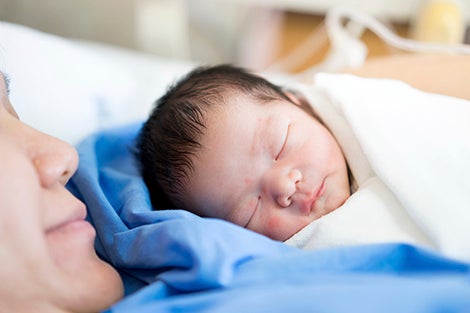For immediate release: Tuesday, September 6, 2016
Boston, MA – Individuals born by cesarean delivery were 15% more likely to become obese as children than individuals born by vaginal birth—and the increased risk may persist through adulthood, according to a large new study from Harvard T.H. Chan School of Public Health. In addition, individuals born via cesarean delivery were 64% more likely to be obese than their siblings born by vaginal birth.
The study was published online September 6, 2016 in JAMA Pediatrics.
The researchers also found that individuals born via vaginal birth among women who had undergone a previous cesarean delivery were 31% less likely to become obese compared with those born via cesarean birth following a cesarean birth.
“Cesarean deliveries are without a doubt a necessary and lifesaving procedure in many cases,” said Jorge Chavarro, associate professor of nutrition and epidemiology at Harvard Chan School and senior author of the study. “But cesareans also have some known risks to the mother and the newborn. Our findings show that risk of obesity in the offspring could be another factor to consider.”
Nearly 1.3 million cesareans are performed each year in the U.S., accounting for one third of all deliveries. While a number of previous studies have suggested a link between cesarean delivery and a higher risk of obesity in offspring, the studies were either too small to detect a clear association or lacked detailed data.
The new analysis included 16 years’ worth of data from more than 22,000 young adults in the Growing Up Today Study (GUTS), in which participants answered survey questions every year or two years from 1996-2012. The researchers looked at the participants’ body mass index (BMI) over time; at whether or not they were delivered via cesarean (using information collected from participants’ mothers, participants in the Nurses’ Health Study II); and at other factors that could play a role in obesity, such as the mothers’ pre-pregnancy BMI, smoking status, age at delivery, and where they lived. They also looked at whether the mothers had previous cesarean deliveries.
“I think that our findings—particularly those that show a dramatic difference in obesity risk between those born via cesarean and their siblings born through vaginal delivery—provide very compelling evidence that the association between cesarean birth and childhood obesity is real,” said Chavarro. “That’s because, in the case of siblings, many of the factors that could potentially be playing a role in obesity risk, including genetics, would be largely the same for each sibling—except for the type of delivery.”
Other Harvard Chan authors involved in the study included lead author Changzheng Yuan, Audrey Gaskins, and Matthew Gillman.
Funding for the study came from grants UM1-CA176726, P30-DK046200, U54- CA155626, T32-DK007703-16, HD066963, HL096905, DK084001, and MH087786 from the National Institutes of Health.
“Association Between Cesarean Birth and Risk of Obesity in Offspring in Childhood, Adolescence, and Early Adulthood,” Changzheng Yuan, Audrey J. Gaskins, Arianna I. Blaine, Cuilin Zhang, Matthew W. Gillman, Stacey A. Missmer, Alison E. Field, and Jorge E. Chavarro, JAMA Pediatrics, online September 6, 2016, doi: 10.1001/jamapediatrics.2016.2385
Visit the Harvard Chan School website for the latest news, press releases, and multimedia offerings.
For more information:
Todd Datz
617.432.8413
tdatz@hsph.harvard.edu
photo: iStock
###
Harvard T.H. Chan School of Public Health brings together dedicated experts from many disciplines to educate new generations of global health leaders and produce powerful ideas that improve the lives and health of people everywhere. As a community of leading scientists, educators, and students, we work together to take innovative ideas from the laboratory to people’s lives—not only making scientific breakthroughs, but also working to change individual behaviors, public policies, and health care practices. Each year, more than 400 faculty members at Harvard Chan School teach 1,000-plus full-time students from around the world and train thousands more through online and executive education courses. Founded in 1913 as the Harvard-MIT School of Health Officers, the School is recognized as America’s oldest professional training program in public health.
